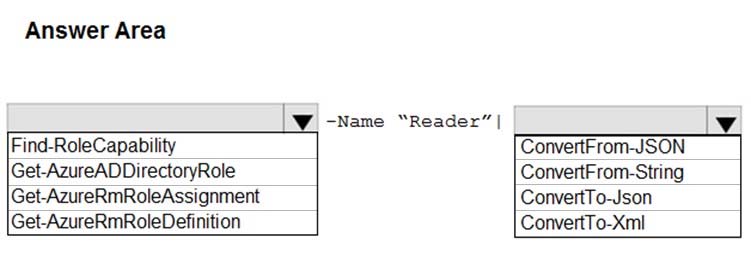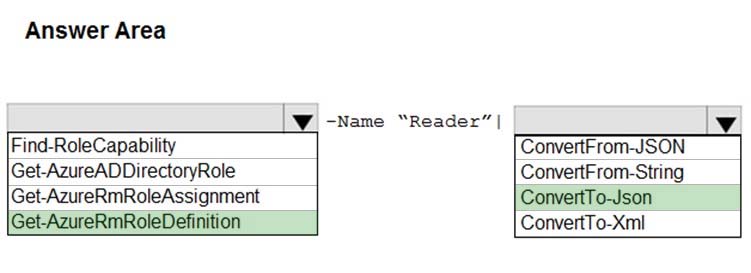Question 186 of 197 from exam AZ-100: Microsoft Azure Infrastructure and Deployment
Question
Case study -
This is a case study. Case studies are not timed separately. You can use as much exam time as you would like to complete each case. However, there may be additional case studies and sections on this exam. You must manage your time to ensure that you are able to complete all questions included on this exam in the time provided.
To answer the questions included in a case study, you will need to reference information that is provided in the case study. Case studies might contain exhibits and other resources that provide more information about the scenario that is described in the case study. Each question is independent of the other questions in this case study.
At the end of this case study, a review screen will appear. This screen allows you to review your answers and to make changes before you move to the next section of the exam. After you begin a new section, you cannot return to this section.
To start the case study -
To display the first question in this case study, click the Next button. Use the buttons in the left pane to explore the content of the case study before you answer the questions. Clicking these buttons displays information such as business requirements, existing environment, and problem statements. If the case study has an
All Information tab, note that the information displayed is identical to the information displayed on the subsequent tabs. When you are ready to answer a question, click the Question button to return to the question.
Overview -
Contoso, Ltd. is a consulting company that has a main office in Montreal and two branch offices in Seattle and New York.
The Montreal office has 2,000 employees. The Seattle office has 1,000 employees. The New York office has 200 employees.
All the resources used by Contoso are hosted on-premises.
Contoso creates a new Azure subscription. The Azure Active Directory (Azure AD) tenant uses a domain named contoso.onmicrosoft.com. The tenant uses the P1 pricing tier.
Existing Environment -
The network contains an Active Directory forest named contoso.com. All domain controllers are configured as DNS servers and host the contoso.com DNS zone.
Contoso has finance, human resources, sales, research, and information technology departments. Each department has an organizational unit (OU) that contains all the accounts of that respective department. All the user accounts have the department attribute set to their respective department. New users are added frequently.
Contoso.com contains a user named User1.
All the offices connect by using private links.
Contoso has data centers in the Montreal and Seattle offices. Each data center has a firewall that can be configured as a VPN device.
All infrastructure servers are virtualized. The virtualization environment contains the servers in the following table.

Contoso uses two web applications named App1 and App2. Each instance on each web application requires 1GB of memory.
The Azure subscription contains the resources in the following table.

The network security team implements several network security groups (NSGs).
Planned Changes -
Contoso plans to implement the following changes:
Deploy Azure ExpressRoute to the Montreal office.
Migrate the virtual machines hosted on Server1 and Server2 to Azure.
Synchronize on-premises Active Directory to Azure Active Directory (Azure AD).
Migrate App1 and App2 to two Azure web apps named WebApp1 and WebApp2.
Technical requirements -
Contoso must meet the following technical requirements:
Ensure that WebApp1 can adjust the number of instances automatically based on the load and can scale up to five instances.
Ensure that VM3 can establish outbound connections over TCP port 8080 to the applications servers in the Montreal office.
Ensure that routing information is exchanged automatically between Azure and the routers in the Montreal office.
Ensure Azure Multi-Factor Authentication (MFA) for the users in the finance department only.
Ensure that webapp2.azurewebsites.net can be accessed by using the name app2.contoso.com

Connect the New York office to VNet1 over the Internet by using an encrypted connection.
Create a workflow to send an email message when the settings of VM4 are modified.
Create a custom Azure role named Role1 that is based on the Reader role.
Minimize costs whenever possible.
HOTSPOT -
You need to implement Role1.
Which command should you run before you create Role1? To answer, select the appropriate options in the answer area.
Hot Area:

Introductory Info
Question
Explanations
